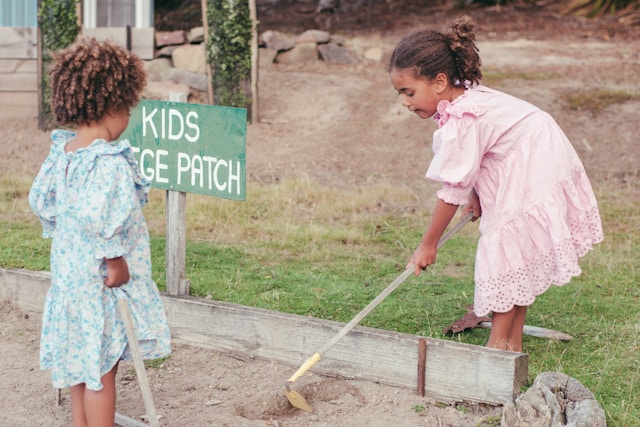Teaching Responsiblity to Kids
 Responsible behavior is an important life skill. Parents play an important role in teaching their children the value and skills to function responsibly within society, including making choices, understanding consequences and meeting obligations. Here we explore various creative strategies for teaching responsibility.
Responsible behavior is an important life skill. Parents play an important role in teaching their children the value and skills to function responsibly within society, including making choices, understanding consequences and meeting obligations. Here we explore various creative strategies for teaching responsibility.
Lead by Example: Model Responsible Behavior
To teach responsibility effectively, one of the most powerful methods is leading by example. Children are quick learners and often copy what adults are doing in their lives. Parents providing concrete examples of what responsibility looks like can demonstrate how children can view it in action. By meeting obligations on time, managing time efficiently, and acknowledging errors when necessary, parents provide children with a tangible model of what it means to act responsibly in practice. Engage your children in everyday tasks such as keeping the house tidy, paying bills, or planning family activities. Discuss the thought processes behind your decisions while emphasizing the consequences of the choices you make. This will teach them responsibility is part of life and give them the skills to navigate their responsibilities confidently.
Delegate Age-Appropriate Chores
Assigning age-appropriate chores is an effective way to teach children responsibility while making them feel capable and accomplished. By customizing tasks to their developmental stage, you can instill ownership and a sense of pride within their young person's heart. Young children may benefit from simple tasks like picking up toys or setting the table to develop independence. As they mature, you can introduce more complex responsibilities, such as taking care of pets, helping with meal preparation or handling laundry independently. Be sure to offer guidance and positive reinforcement, which will enable them to comprehend the significance of their contributions. Gradual responsibility not only empowers children but also develops life skills essential for future success.
 Encourage Decision-Making
Encourage Decision-Making
Facilitating responsible decision-making among children is central to nurturing responsibility. Allowing them to make choices from selecting their outfits to planning weekend activities empowers them to consider carefully about potential repercussions of their actions and develop greater self-awareness. Commence by providing options tailored to their age and discussing potential outcomes of each choice to foster understanding about how decisions impact lives both theirs and those around them. Reward their achievements and guide them through mistakes as learning experiences, with children participating regularly in decision-making processes to teach them accountability for their choices as well as build their self-esteem and independence over time.
Create a Responsibility Chart
A responsibility chart can serve as an effective visual tracking and accountability aid for children. With it you can track daily or weekly chores, expectations, or tasks with ease for young ones to comprehend. Assign specific responsibilities tailored to each child's age and capabilities to give them ownership over their contributions. Use stickers or check marks as rewards for completed tasks to promote positive behavior while creating a sense of achievement and progress. Review your chart regularly together, discussing its success and areas for potential improvement. Not only does this practice teach children the importance of meeting obligations but it can also foster family cohesion as members can help one another accomplish tasks and meet shared goals together.
 Discuss Personal Goals
Discuss Personal Goals
Discussing personal goals with children is an integral component of developing their sense of responsibility and self-direction. Start by encouraging them to think about what goals they want to reach in terms of academics, sports or hobbies, it might just take an act of will. Help them set realistic and measurable goals by breaking them down into manageable steps, instilling ownership and motivation to pursue these objectives. Encourage regular check-ins to review progress, celebrate achievements, and adjust goals as necessary. By creating an open environment for aspirational discussions, you help your children understand perseverance and adaptability despite obstacles, reinforcing confidence and independence as they strive for success.
Foster Accountability Through Consequences
Promoting accountability with consequences is important to teaching children responsibility. Establishing clear expectations for their behavior and performance, with appropriate consequences should they meet or fail to do so, is of utmost importance. Children who understand that their actions have direct repercussions are more likely to accept responsibility for their decisions and take ownership of them. For example, neglecting homework may mean less playtime or additional study sessions. Importantly, consequences should be consistent and fair so children can learn from their mistakes without feeling punished for them. Engaging children in discussions regarding these consequences encourages reflection on actions taken and understanding of accountability, ultimately leading them to make better decisions in the future.
 Engage Them In Family Decisions
Engage Them In Family Decisions
Involving children in family decisions is an effective way to instill responsibility. Get their input when planning events like weekend activities or meal planning. This teaches children not only how they can voice their ideas, but also demonstrates how valued contributions impact family dynamics and dynamics overall. As soon as kids realize their ideas matter more to others in the family dynamic, their sense of duty towards family well-being increases significantly.
Encourage Community Involvement
Encouraging community involvement can be an effective way of teaching kids responsibility. Get them involved with volunteer activities, be it at a shelter, park clean-up event, or charity fundraiser. Such experiences will build empathy while reinforcing the importance of contributing something larger than themselves. Discuss their contributions' effects as you help them grasp the responsibility that comes with involvement with local community projects.
Establish After-School Routines
Establishing after school routines can greatly strengthen a child's sense of responsibility and time management abilities. Create a schedule with designated times for homework, chores, leisure activities, and relaxation or playtime after responsibilities have been fulfilled. When arriving home from school, children should first dedicate a specific amount of time to completing homework before engaging in chores like tidying their room or prepping for the following day's schedule. Adding in relaxation or playtime after these duties is also recommended to keep motivation levels high. Encouraging children to commit to this routine can help build self-discipline as well as prepare them to manage time effectively later.






